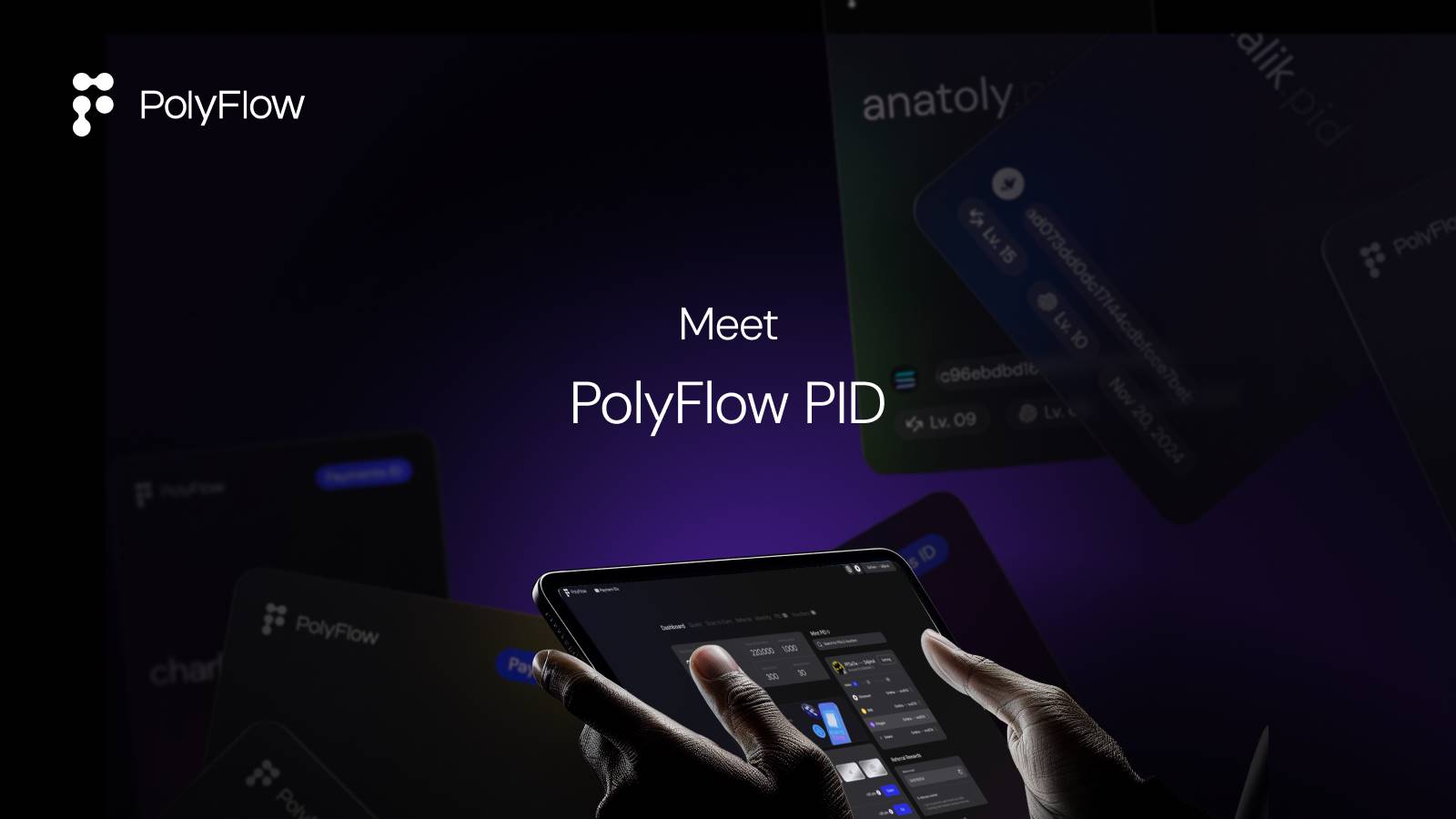PID is a DID specifically tailored for payment scenarios, bridging real-world identity and cryptocurrency wallets, helping users store, verify, and manage real-world data in the form of digital credentials, meeting compliance requirements while ensuring privacy, truly achieving "data self-control."
Author: PolyFlow
The call for the widespread adoption of cryptocurrency has persisted for years, yet blockchain remains an isolated island, struggling to integrate into daily digital life. Even though Web3 has built powerful tools and infrastructure, most users still linger on Web2's centralized platforms, passively accepting data control, creating fragmented information islands. The promise of "user control over data" in Web3 has yet to be fulfilled, as it has been unable to reasonably utilize real-world data while ensuring privacy and not relying on new intermediaries.
Now, with the launch of PID by PolyFlow, through zero-knowledge proof (ZKP) and Attestation Service technology, data from Web2 centralized platforms can be utilized on-chain, while also providing a bridge for Web3 applications to "go off-chain."
As a one-stop consumer cryptocurrency payment infrastructure, PolyFlow is dedicated to using blockchain technology to connect on-chain assets with off-chain life, starting with seamless cryptocurrency payments and extending to on-chain finance and more scenarios in the future. PID is the core facility on this path.

Why is PID important?
Decentralized Identity (DID) is an innovative model where users generate a public-private key pair, create a DID document, and store it on a decentralized network like blockchain, returning control of identity from platforms to users, achieving "self-sovereign identity."
In PolyFlow's PID system, users bind various credentials to their DID and store them in the form of Verifiable Credentials (VCs), ensuring privacy verification while guaranteeing that asset and identity data belong to the user.
PID is a DID specifically tailored for payment scenarios, bridging real-world identity and cryptocurrency wallets, helping users store, verify, and manage real-world data in the form of digital credentials, meeting compliance requirements while ensuring privacy, truly achieving "data self-control."
PolyFlow co-founder Raymond stated, "PID is like your physical wallet, containing cash, documents, cards, and various credentials."
Based on this concept, the application prospects of PID are vast, and it will become an important infrastructure in digital life in the future.

Redefining Cryptocurrency Wallets
Currently, most cryptocurrency wallets are only used to store assets, but as stablecoins and cryptocurrency payments gradually become mainstream, this is far from enough. For example: boarding to attend Token2049 requires identity verification, and enjoying drinks at a bar requires age verification; these credentials are typically found in your physical wallet, not your cryptocurrency wallet.
PID, leveraging zero-knowledge proof (ZKP) and Attestation Service (AS) technology, endows wallets with "credential storage + verification" functions, making them not just asset containers but also digital identity carriers that meet the diverse needs of daily life.
With PID, wallets will possess the following core functions:
- Verifiable Credentials (VCs)
Digital credentials issued by trusted institutions that users can hold and present as needed to verify identity, credit scores, SIM binding, etc., without exposing unnecessary information, achieving on-chain identity management.
- Privacy-protecting Data Verification
Using ZKP technology, users can prove they meet KYC, have good credit, or are SIM-registered without disclosing specific data, reducing the risk of privacy breaches.
- Cross-scenario Payment and Access Control
Wallets can integrate credential permissions to adapt to various needs such as payment, identity verification, reward collection, and device authorization, truly bridging identity and payment functions.
- Enhanced Real-world Mapping
As the VC ecosystem matures, wallets will gradually acquire all the functions of physical wallets, even surpassing them, becoming the primary digital identity portal for Web3 users.
Essentially, PID upgrades cryptocurrency wallets from mere asset storage tools to trusted, privacy-friendly identity credential carriers, meeting users' daily payment, identity verification, and access authorization needs, paving the way for the widespread adoption of cryptocurrency.

Application Scenario — SIM Real-name Verification
Traditional eSIM or credit card applications often require independent KYC processes. PID utilizes verifiable credentials to achieve cross-platform identity verification, reducing compliance costs.
At PolyFlow, we integrate the Solana Attestation Service (SAS), putting transaction credentials and user identities on-chain, ensuring that every payment and identity verification is traceable, verifiable, and tamper-proof.
Combining PID with SAS, PolyFlow supports ROAM (a DePIN open wireless network based on OpenRoaming and eSIM) in issuing and verifying on-chain SIM real-name credentials.
After completing a KYC, when applying for a ROAM SIM card, users only need to verify the credentials on-chain to complete the SIM issuance without repeated authentication, reducing fraud risk and achieving decentralized, privacy-friendly real-name verification.
In the future, PID + SAS can also support more scenarios:
- DeFi Lending and Credit Scoring
User on-chain credit behaviors (repayment, collateral, etc.) can be written into PID credentials, allowing lending protocols to directly call real-time trusted credit scores.
- Supply Chain Finance Credentials
Authenticity credentials such as invoices, warehouse receipts, and bills of lading can be put on-chain through SAS, helping financing parties disburse loans faster and reducing trade finance fraud risks.
Additionally, leveraging ZKP technology, PID achieves privacy-protecting verification, such as confirming "over 18" without publicly disclosing complete identity documents, ensuring a win-win for compliance and privacy.

Call to Action
To truly integrate cryptocurrency into the lives of the public, it is essential to address its adaptation issues within the existing internet ecosystem. PID serves as this bridge, relying on real-world data, ensuring privacy, and enabling decentralized verification, creating a composable identity infrastructure for Web3.
PID not only reshapes cryptocurrency wallets but also redefines the boundaries between Web2 and Web3. In the future, new applications based on verifiable interactions will emerge, enhancing user control, reducing interaction friction, and accelerating value release.
PID is not just a protocol; it is a digital infrastructure that reconstructs the flow of information and the establishment of trust. PolyFlow will soon launch multiple PID-related tasks on DAPP, inviting everyone to explore PID application scenarios together, so stay tuned.
About PolyFlow
PolyFlow is the first modular PayFi infrastructure, dedicated to connecting real-world assets (RWA) with decentralized finance (DeFi). As the infrastructure layer of the PayFi network, PolyFlow integrates traditional payments, cryptocurrency payments, and DeFi, decentralizing the processing of real payment scenarios. PolyFlow provides the necessary infrastructure to create PayFi scenarios, ensuring compliance, security, and seamless integration of real-world assets, helping to build a new generation of financial paradigms and industry standards.
Learn more: X|Telegram|Medium| DAPP| Official Website
Media Contact: media@polyflow.tech
免责声明:本文章仅代表作者个人观点,不代表本平台的立场和观点。本文章仅供信息分享,不构成对任何人的任何投资建议。用户与作者之间的任何争议,与本平台无关。如网页中刊载的文章或图片涉及侵权,请提供相关的权利证明和身份证明发送邮件到support@aicoin.com,本平台相关工作人员将会进行核查。




